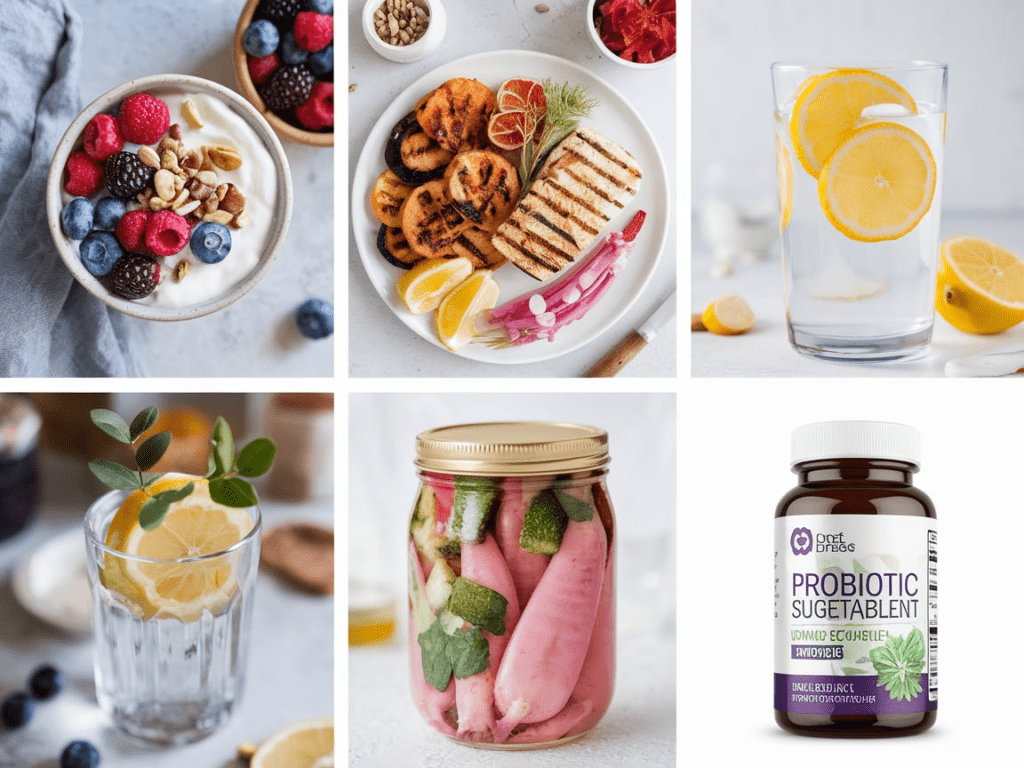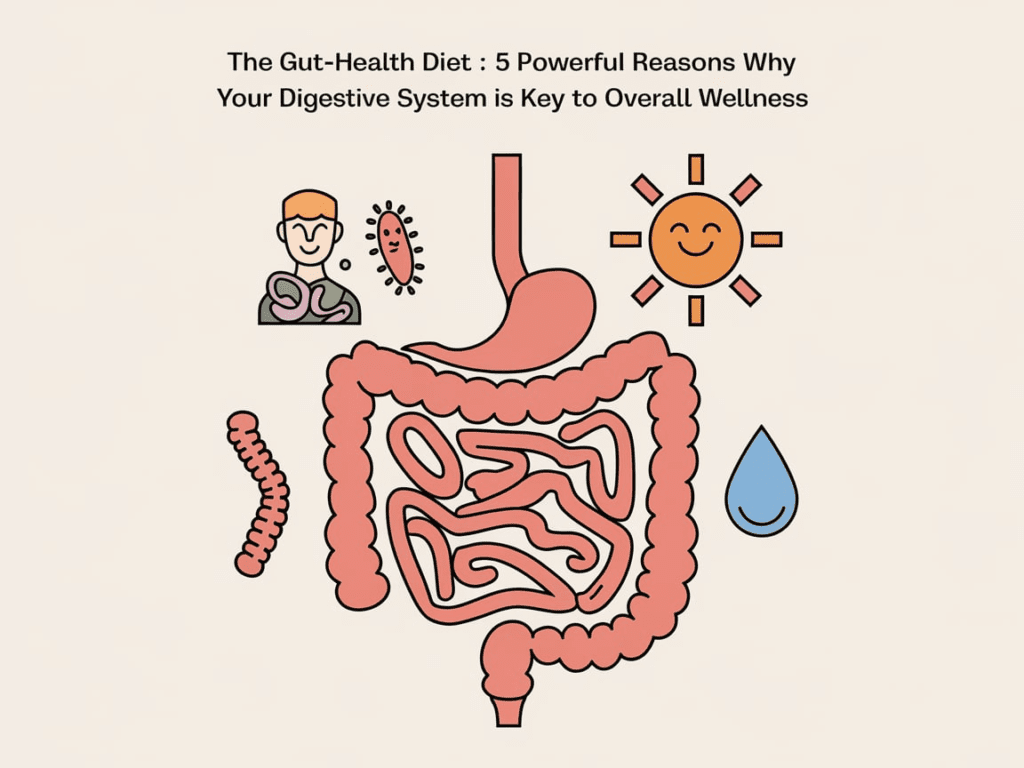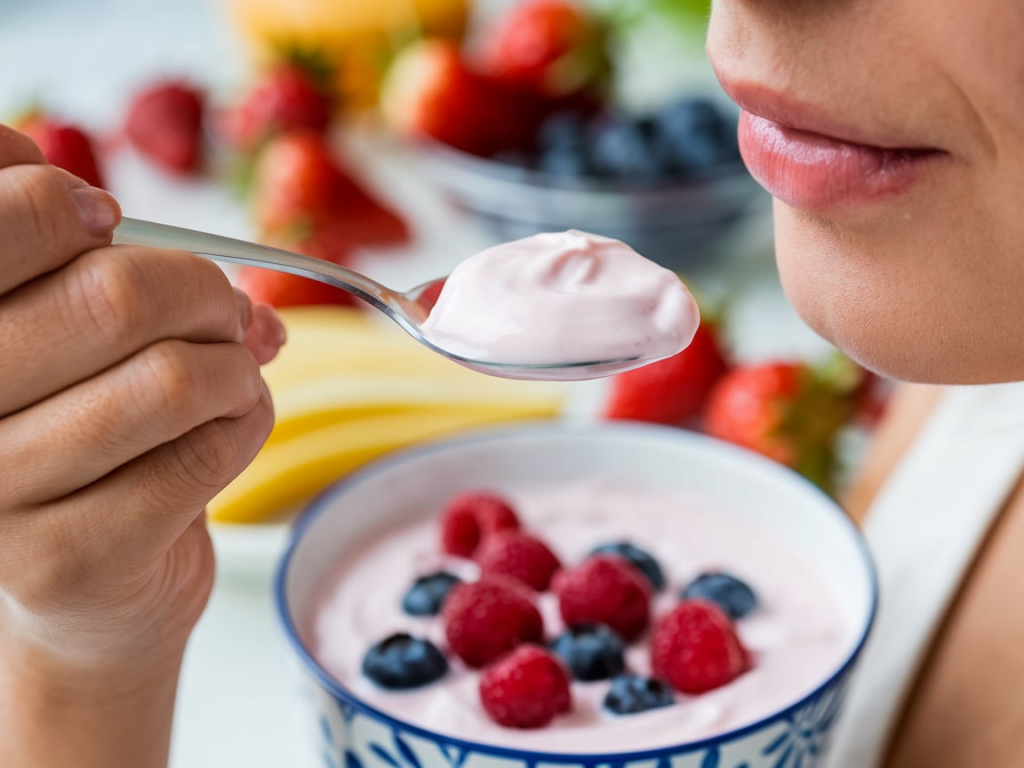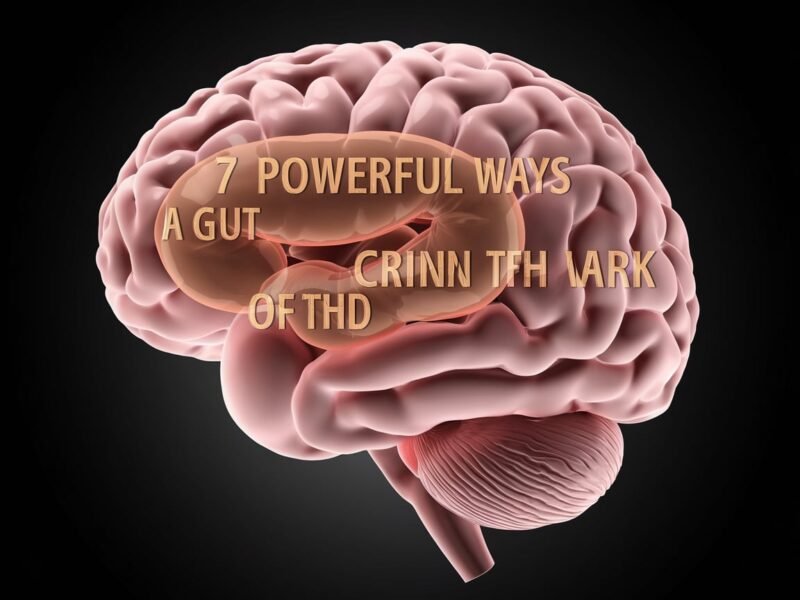Meta Description:
“Learn how the gut-health diet can transform your wellness journey. Discover why your digestive system is crucial for immunity, mood, skin health, and more, and how to optimize it for a healthier life.”
The Gut-Health Diet: Why Your Digestive System is the Key to Overall Wellness

The importance of gut health has become increasingly apparent in recent years. The gut, often referred to as the body’s “second brain,” plays a vital role in overall wellness. It influences everything from digestion to immunity, mental health, and even skin quality. As we move into 2025, understanding the powerful connection between gut health and your overall well-being is crucial for achieving a healthier lifestyle.
In this article, we’ll explore why your digestive system is the key to overall wellness and how a gut-health diet can have a profound impact on your health.
1. The Gut Microbiome: A Hidden Powerhouse

Your gut is home to trillions of bacteria that collectively form the gut microbiome. This hidden powerhouse is integral to maintaining a balanced immune system, aiding digestion, and even influencing your mood. In fact, over 70% of your immune system is housed in the gut, making it the body’s first line of defense against harmful pathogens.
A balanced gut microbiome can promote digestive health, while imbalances can lead to issues such as bloating, constipation, and even immune system dysfunction. A gut-health diet that nourishes beneficial bacteria helps maintain this delicate balance. Research on the importance of gut microbiome and health highlights how diet can shift the microbiome for better health.
2. The Key Components of the Gut-Health Diet

A well-rounded gut-health diet includes foods that promote a healthy microbiome, improve digestion, and support overall wellness. Here are the key components to include in your diet:
a) Fiber-Rich Foods
Fiber is essential for feeding the good bacteria in your gut. Foods such as whole grains, vegetables, fruits, and legumes are excellent sources of fiber and promote healthy digestion and regular bowel movements.
b) Prebiotics
Prebiotics are special types of fiber that act as food for beneficial gut bacteria. Foods like garlic, onions, bananas, and asparagus are rich in prebiotics and promote a healthy gut environment.
c) Probiotics
Probiotics are live microorganisms that can improve the balance of your gut microbiome. Fermented foods such as yogurt, kimchi, kefir, and miso are excellent sources of probiotics and help promote gut health.
d) Fermented Foods
Fermented foods contain beneficial bacteria that support gut health and nutrient absorption. Including kombucha, kimchi, and sauerkraut in your diet can help enhance your microbiome’s diversity.
3. The Gut-Brain Connection: How Your Gut Affects Your Mental Health

Did you know that your gut can influence your mood and mental health? The gut is often referred to as the “second brain” because it produces neurotransmitters like serotonin, which is responsible for regulating mood and emotional well-being. In fact, up to 90% of serotonin is produced in the gut.
A gut-health diet that supports the growth of beneficial bacteria can positively impact mental health by promoting serotonin production and improving brain function. This connection is essential for reducing the risk of mental health conditions such as anxiety and depression. For further details, see the research on the Gut-brain connection.
4. Gut Health and Immunity: A Stronger Defense Against Disease

A healthy gut is the foundation of a strong immune system. The gut microbiome is closely linked to immune function, and a balanced microbiome can help reduce inflammation, strengthen the body’s defense mechanisms, and prevent chronic diseases.
By eating a diet rich in probiotics, fiber, and anti-inflammatory foods, you can enhance your gut health and support your immune system. Foods like berries, leafy greens, and ginger help reduce inflammation and promote overall wellness. Learn more about gut health and immunity from trusted sources like Harvard Health.
5. Gut Health for Skin: Achieving a Clearer Complexion

The link between gut health and skin health is becoming increasingly evident. Many common skin conditions, such as acne, eczema, and rosacea, are believed to be linked to an imbalance in the gut microbiome. When your gut is out of balance, it can trigger inflammation that manifests on your skin.
A gut-health diet can help reduce inflammation, promote nutrient absorption, and lead to healthier, clearer skin. Foods rich in antioxidants, such as berries, leafy greens, and avocados, help combat skin problems from within. For more on the relationship between diet and skin health, visit Healthline’s gut and skin health guide.
6. Foods to Avoid for Better Gut Health
While certain foods nourish the gut, others can disrupt the balance of your microbiome. Here are some foods to limit or avoid:
- Processed foods: High in sugar and unhealthy fats, processed foods can feed harmful bacteria and disrupt gut balance.
- Refined grains: White bread, pasta, and rice can cause blood sugar spikes and inflammation in the gut.
- Excessive alcohol: Alcohol can damage the gut lining and disrupt the microbiome, leading to imbalances.
- Artificial sweeteners: Some studies show that artificial sweeteners can negatively impact gut bacteria and digestive function.
Conclusion: The Power of Gut Health
Your gut is the foundation of your overall health. A gut-health diet that is rich in fiber, prebiotics, probiotics, and fermented foods can help improve digestion, boost immunity, enhance mental clarity, and support clearer skin. The more we learn about the gut-brain connection and the impact of the microbiome on various aspects of our health, the clearer it becomes that maintaining a healthy gut is the key to a healthier, more vibrant life.
By prioritizing your gut health and making small dietary changes, you can take control of your overall wellness and unlock the full potential of your body and mind.
FAQs:
- What is the gut-health diet? The gut-health diet focuses on eating foods that support a healthy microbiome, including fiber, prebiotics, probiotics, and fermented foods. These foods promote digestive health and overall wellness.
- How does gut health affect mental health? The gut produces neurotransmitters like serotonin, which regulates mood and emotional well-being. An imbalanced gut can lead to mood disorders like anxiety and depression, while a healthy gut can improve mental clarity and stability.
- What are some good sources of probiotics? Probiotic-rich foods include yogurt, kimchi, kefir, and miso. These fermented foods help replenish beneficial bacteria in the gut.
- How can a gut-health diet improve immunity? A healthy gut microbiome plays a crucial role in regulating immune function and reducing inflammation. Eating fiber, probiotics, and anti-inflammatory foods helps strengthen your immune system and fight off illness.
- Can gut health improve my skin? Yes, improving gut health can lead to clearer skin by reducing inflammation and promoting better nutrient absorption. A gut-health diet can help combat skin issues such as acne and eczema.
Resources:
- Harvard Health – The Gut Microbiome and Its Role in Health: Learn more about how gut bacteria affect overall health.
- The American Gut Project: Explore ongoing research about the gut microbiome and its connection to wellness.
- PubMed – Probiotics and Mental Health: Review studies linking gut health and mood disorders.
- Healthline – Top Gut-Healthy Foods: A guide to the best foods for supporting digestive health.
- National Institute of Health – Gut Health and Immunity: Research on how the gut impacts immune system functioning.



